Lake Malawi Travel Guide
Occupying a fifth of the country, Lake Malawi is the third largest lake in Africa and home to more fish species than any other lake in the world. Also known as Lake Nyasa, it is often referred to as 'the calendar lake' because it is 365 miles (590km) long and 52 miles (85km) wide.
Situated between Malawi, Mozambique and Tanzania, this African Great Lake is about 40,000 years old, a product of the Great Rift Valley fault line. There are fishing villages to be found along the lakeshore where residents catch a range of local fish including chambo, kampango (catfish), lake salmon and tiger fish. The export of fish from the lake contributes significantly to the country's economy, and the delicious chambo, similar to bream, is served in most Malawian eateries.
Visitors to Lake Malawi can see colourful mbuna fish in the water, while there are also occasional sightings of crocodiles, hippos, monkeys and African fish eagles along the shore. The nearby Eastern Miombo woodlands are home to African wild dogs. Swimming, snorkelling and diving are popular activities in the tropical waters of the lake, and many visitors also enjoy waterskiing, sailing and fishing.
There are many options available for holiday accommodation at the lake, including resorts, guesthouses and caravan or camping parks. All budgets are catered for, with luxury lodges attracting the glamorous and humble campsites hosting families and backpackers. Cape Maclear is a well-developed lakeside town, and nearby Monkey Bay is a great holiday resort area. Club Makokola, near Mangochi, is also a popular resort.
Things to do in Lake Malawi
This UNESCO World Heritage Site is by far the most popular destination in Malawi. The main activities along the lake shore are freshwater diving and snorkelling, game viewing, kayaking, boat rides to various islands and beaches, fishing, horse-riding and sunbathing.
In most of the tourist hubs mentioned below, it's possible to enjoy the resort attractions of watersports and well-tended beaches, as well as shopping in craft markets and homestays with local families.
Tourist facilities are varied, with some luxury resorts offering an all-inclusive experience and other areas remaining largely non-commercialised. ATMs are available here and there and credit card acceptance is on the rise, but neither should be relied upon when exploring the Lake Malawi region. It's best to find out in advance from your resort what to expect and arrange accordingly.
Most of the lake is accessed by short dirt roads leading off the tarred roadways that run its length. Outside of the dry season (May to October) these dirt roads can become difficult to traverse. Even in the dry months, a 4x4 vehicle is required for those planning extensive travels.
Although the infrastructure is not always impressive, getting around is comparatively easy, especially as the locals are generally friendly and helpful. Lake Malawi is also pleasantly uncrowded, despite its undeniable appeal, and visitors seldom struggle with reservations for accommodation, restaurants and activities.
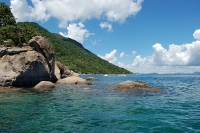
Lake Malawi National Park
Established in 1980, Lake Malawi National Park is listed as a UNESCO World Heritage Site for its importance in the study of evolution. The lake is said to contain the largest number of fish species, nearly all endemic, of any lake in the world. 4th-century Iron Age sites have been found in the area, while mammals found in the region include baboons, vervet monkeys, spotted hyenas, leopards, and the occasional elephant. The varied bird life includes black eagles, fish eagles, and many waders. Reptiles include the African python, crocodiles, and abundant water monitor lizards, especially on Boadzulu Island. At Cape Maclear, within Lake Malawi National Park, there are a variety of upmarket operations combining accommodation with lake activities. Danforth Yachting has a lakeside lodge and a 38ft catamaran available to visitors. Mumbo Island and Domwe Island camps offer pleasant island retreats, while Cape Mac Lodge also offers accommodation and activities out of Chembe village. Pumulani is also considered one of the lake's finest lodge destinations. The National Park is on the scenic northern tip of the Nankhumba Peninsula, which divides the southern end of Lake Malawi, with a number of sandy bays including a fine beach near Chembe and Otter Point. There are marked seasonal variations in wind, temperature, and rainfall.
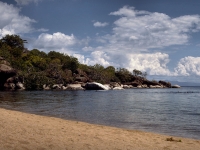
Cape Maclear
This unassuming tourist hub is the gateway to some of Lake Malawi's most popular upmarket lodges and camps, and therefore a very common entry point for those visiting the region. Located on Lake Malawi, the small fishing village has an unusual layout, with the majority of the local fishermen living in the centre of the settlement. For travellers, this means that the everyday lives of rural Malawians are refreshingly on display in Cape Maclear, giving it a very authentic feel. Car rentals and bus services are available to get travellers to and from the town, although some roads are badly potholed, making 4x4 vehicles the most popular option.
Salima
Salima, the most convenient entry point to Lake Malawi, is a one- to two-hour drive from Lilongwe. The town is home to some great holiday resorts, such as Sunbird Livingstonia Beach Resort, and boasts some picturesque beaches. Senga Beach, in Salima, is a popular weekend getaway for Lilongwe locals. Signposted just before Salima is Kuti Wildlife Park, which offers travellers campsites, A-frame chalets and a small restaurant, as well as bar and barbeque facilities. Animals found in the park include sable, nyala, zebra, wildebeest, ostrich, giraffe and waterbuck. If travellers plan to visit during the rainy season, they should be sure to take a 4x4 as the roads can become tricky, even during the dry season (May to October).
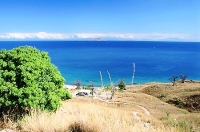
Likoma Island
Likoma Island is an isolated enclave of Malawi, completely surrounded by Mozambican waters, and was colonised by Anglican missionaries in the late 1800s. This island is a popular holiday destination, with beautiful beaches and iconic African scenery featuring baobab trees and open grasslands. One of the main man-made attractions on the island is the Anglican Cathedral, a large structure in the main town of Mbamba that was built out of stone by the missionaries in 1903. The beautiful, upmarket Kaya Mawa Hotel dominates the tourist trade on the island. The more budget-friendly Mango Drift Backpackers is also a popular choice, with a couple of guesthouses available. There are very basic dirt roads spanning Likoma Island, but most places can be reached on foot. The island's electricity, supplied by generators, is usually switched off at about 10pm each night.
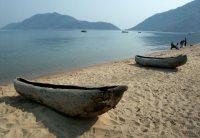
Monkey Bay
A small port town on the southern end of Lake Malawi, Monkey Bay (Lusumbwe) gets its name from the large monkey population in the area, and spotting them can be great fun. Though perhaps Malawi's best-known resort area, the facilities are minimal, with only a handful of shops, markets, and banking amenities catering to tourists. Popular with tourists headed to Cape Maclear, Monkey Bay offers sandy beaches with some diving opportunities and a few diving schools. Other popular activities in Monkey Bay include kayaking and cruises to Cape Maclear and Liwonde National Park.
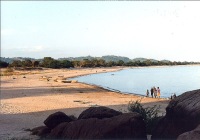
Nkhotakota
A small and basic town on the shores of Lake Malawi, Nkhotakota has a traditional market and a few hotels and bars, but the main attractions for travellers are in the surrounding region. The Nkhotakota Wildlife Reserve has hot springs and hippo pools. The beaches of Lake Malawi offer activities such as kayaking, snorkelling, and cruises, making Nkhotakota a good base for tourists wanting to explore the area. For those wanting to brush up on their handicap, the Kasasa Club in Nkhotakota has a golf course. Nkhotakota played an important part in Malawi's history as the place where David Livingstone met with slave traders in an attempt to end the slave trade in Malawi, and knowledgeable guides conduct walking tours of historical points of interest.
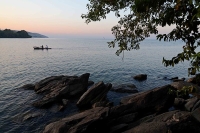
Nkhata Bay
Nkhata Bay is a busy fishing village on the shores of Lake Malawi, near Mzuzu. The town is well-placed for tourists to take advantage of the beaches at Chikale, where they can kayak, take day cruises, or dive and snorkel. The diving schools in Nkhata Bay are famously cheap but quality varies so it is best to get recommendations beforehand. Other attractions in Nkhata Bay include tours of the Kawalazi coffee plantation and Chombe rubber and tea plantations, or hiking up the cliff faces to watch the fish eagles feeding. There are a few craft markets in Nkhata Bay, and some bars and restaurants serving Malawian pizza and freshly caught fish. Nkhata Bay is the second busiest resort area on the lake, easily accessible by Malawian standards, and well-equipped for travellers, with a variety of accommodation being available.
Malawi travel info
Electricity
Electrical current is 230 volts, 50Hz. Three-pin, rectangular blade plugs are standard.
Language
English is the official language and widely spoken and understood, but Chichewa is the home language of the majority.
Money
The official currency is the Malawian Kwacha (MWK), which is divided into 100 tambalas. Foreign currencies are accepted by banks, authorised hotels and other institutions in the main town centres. Bureaux de change are also available. The US Dollar is the easiest currency to exchange. ATMs are widely available and credit cards are accepted. It's wise to keep a reserve supply of cash as power cuts can affect the use of ATMs and credit cards.
Tipping
Service charges are generally not included in hotel and restaurant bills, and tipping is at the client's discretion. It is common practice to tip guides in the national parks.
Health
Malaria is a health risk in Malawi throughout the year, especially on the coast. Cases of dengue fever and chikungunya fever have been reported and are also transmitted by mosquitoes. Precautionary measures against being bitten should be taken at all times. Vaccinations are recommended for hepatitis A, hepatitis B and typhoid; all eligible travellers should be up to date with their COVID-19 vaccines. Travellers coming from a country with yellow fever require inoculation against the disease. Tap water should not be drunk unless it has been boiled or chemically treated. Medical facilities are limited and, outside of the capital and other urban areas, medical care may be difficult to find. Limited medications are available but it is advisable to bring along a medical kit for private use. Comprehensive medical insurance is advised.
Safety
Malawi is considered a relatively safe country in which to travel and the vast majority of visits are trouble-free, but sensible precautions should be taken with regards to personal possessions and security, particularly after dark. There have been reports of robberies, money scams involving tourists, muggings and 4x4 vehicles being hijacked.
Most crime is petty and opportunistic and much of it occurs around bus stations and in other crowded public areas. Visitors should carry a photocopy of their passport and visa at all times, but original documents should be stashed in a hotel safe when possible. Travellers are advised to avoid street protests and political rallies, which can become violent.
Local customs
It is customarily expected by most Malawians to be greeted with a friendly 'Hello, how are you?' and a handshake. It is courteous to ask permission before taking photographs of people. Homosexual acts are sadly illegal.
Women may generally dress as they please but should take local custom and religion into account when travelling outside of the main tourist areas and consider covering legs and shoulders to avoid giving offense.
Doing business
Business in Malawi is quite formal. Business cards are usually exchanged on meeting, accompanied by a firm handshake. Punctuality is important and dress should be formal; lightweight suits with a tie are acceptable.
English is Malawi's official language and almost all business is conducted in English. Malawians tend to be very polite and thoughtful, and expect the same treatment in return. Business hours usually start fairly early, from about 7.30am to 5pm, Monday to Saturday.
Duty free
Travellers to Malawi do not have to pay customs duty on 200 cigarettes or 250g of tobacco. For travellers over 18 years of age 1 litre of spirits, and 1 litre of alcohol like beer or wine, can be brought into the country without incurring duty fees.
Communications
The international dialling code for Malawi is +265. The outgoing code is 00 followed by the relevant country code (e.g. 0027 for South Africa). Telephone calls within Malawi are cheap, and the network is reliable between major towns and cities. There is good mobile coverage throughout the country and WiFi is available in all hotels and lodges. Local SIM cards are readily available from street vendors.
Passport & Visa
Those passengers who attain a visa on arrival and who want to extend this visa beyond the 60 day extension option must apply for a residence permit. All foreign passengers to Malawi must hold return or onward tickets and the necessary travel documentation for their next destination, and sufficient funds to cover their expenses while in the country. A yellow fever vaccination certificate is required to enter Malawi if visitors are arriving from or transiting through an infected area. It is highly recommended that visitors' passports have at least six months' validity remaining after the intended date of departure from their travel destination. Immigration officials often apply different rules to those stated by travel agents and official sources.
Entry requirements
US citizens must have a passport that is valid upon their arrival in Malawi. They can attain a visa on arrival for a maximum stay of 30 days, and can extend this visa for an additional 60 days.
British citizens must have a passport that is valid upon their arrival in Malawi. They can attain a visa on arrival for a maximum stay of 30 days, and can extend this visa for an additional 60 days.
Canadian citizens must have a passport that is valid upon their arrival in Malawi. They can attain a visa on arrival for a maximum stay of 30 days, and can extend this visa for an additional 60 days.
Australian citizens must have a passport that is valid upon their arrival in Malawi. They can attain a visa on arrival for a maximum stay of 30 days, and can extend this visa for an additional 60 days.
South African citizens must have a passport that is valid upon their arrival in Malawi. No visa is required for stays of up to 90 days.
Irish citizens must have a passport that is valid upon their arrival in Malawi. They can attain a visa on arrival for a maximum stay of 30 days and can extend this visa for an additional 60 days.
New Zealand citizens must have a passport that is valid upon their arrival in Malawi. They can attain a visa on arrival for a maximum stay of 30 days and can extend this visa for an additional 60 days.
Useful contacts
Official Tourism Website of Malawi: www.visitmalawi.mw
997Embassies / consulates in other countries
Malawi Embassy, Washington DC (also responsible for Canada): +1 202 721 0270
Malawi High Commission, London: +44 20 7421 6010
Malawi Embassy, Washington DC: +1 202 721 0270
Malawi Consulate, Melbourne: +613 9988 7766
Malawi High Commission, Johannesburg: +27 11 234 6424
Embassies / consulates in Malawi
United States Embassy, Lilongwe: +265 1 773 166
British High Commission, Lilongwe: +265 1 772 400
Canadian High Commission, Maputo, Mozambique (also responsible for Malawi): +11258 2149 2623
Australian Embassy, Harare (also responsible for Malawi): +263 4 8532 3555
South African High Commission, Lilongwe: +265 1 77 3722
Embassy of Ireland, Lilongwe: +265 1 77 6408



